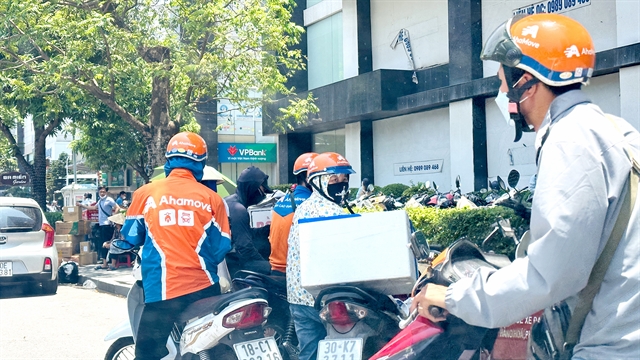 Economy
Economy

 |
| Delivery drivers wait for consumers to pick up their parcels. E-commerce allows consumers to purchase items without leaving the comfort of their homes, but at some cost to the environment. — VNA/VNS Photo Minh Nghĩa |
HÀ NỘI — Although consumers these days can do a lot of their shopping from home with the help of e-commerce, such convenience comes at a cost to the environment, particularly in the form of packaging waste.
A representative from a delivery company said merchants, in the past few years, were using too much packaging for online orders, resulting in a tremendous amount of extra waste in landfills every year.
"Overconcerned with shipping damage, merchants normally encase their products with five-layer cardboard instead of three-layer and unnecessarily wrap them with additional layers of bubble wrap," he said.
Nguyễn Thanh Hưng, a representative from the Vietnam E-Commerce Association, shared this view. He said e-commerce in Việt Nam, with an annual growth rate of 25 per cent, was "generating too high an amount of plastic bags as waste".
He said it's time to change the mindset of "growing at all costs" in the sector and bring environmental concerns to the fore. Otherwise, its impact could be devasting.
"Regulatory bodies have been so concerned with the growth in e-commerce that they lost sight of the environment," said Hưng.
He suggested regulatory bodies formulate environment-centred legal documents by referencing China's Law on E-commerce 2018, which made it mandatory for companies to use eco-friendly materials in packaging.
On the bright side, heavyweights in the sector, including Lazada, have become more environmentally conscious in recent years and actively engaged in green actions such as cutting back on plastic bags.
Vũ Quốc Thịnh, Director of Lazada Logistics Vietnam, said his company had deployed automatic packaging systems to improve packaging efficiency and reduce waste. It also went so far as to use FSC-certified bags and recycled cardboard to lessen its impact on the environment.
Vietnam Post jumped on the bandwagon by employing electric scooters for its delivery services and using recyclable materials for packaging items. The green efforts have allowed the company to cut its carbon footprint nearly nine-fold.
Phan Trọng Lê, Head of the Brand Strategy Department at Vietnam Post, said packaging in Việt Nam is inefficient owing to the lack of packaging standards.
“It's a common practice that merchants package items at their own discretion before getting them delivered by a delivery company. The absence of packaging standards has proved to be highly problematic," said Lê.
Lã Hoàng Trung, Director of the Department of Posts, Ministry of Information and Communications, said the Strategy for the Development of the Post until 2025 had been implemented, but environmental concerns slipped through the cracks.
"Going green in postal services has not been taken seriously in developing countries," said Trung.
The director said education and communication would be instrumental in raising environmental awareness among e-commerce companies in the long term. In the short term, however, it is regulations that would hit the spot. — VNS